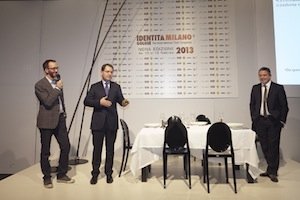We’ve asked Federico De Cesare Viola, presenter of the first edition of Identità di Sala (narrated at the time by Luciana Squadrilli) to summarise “in cold mind” the best moments of the day, in 10 points and as many considerations from which to start again with the second edition, in 2014.
1) The standing ovation that audience and colleagues dedicated to master Antonio Santini: for his unique professional history, his precious stories, his refined and sober style which has been and still is a model for everyone, a made-in-Italy heritage to safeguard.
2)
Josep Roca’s synesthetic universe. His are wine passions – from Bourgogne’s pinot noirs to Mosel’s rieslings – transferred through musical notes, chromatic emotions, tactile sensations. Among molecular food and wine pairings and multisensory experiences, Roca unveiled the work and the research hidden behind the service of wine at the
Celler. A reasoned and (even too) cerebral journey, which is translated, once you sit at the table, into pure poetry.
3)
Davide Groppi’s lecture. He’s the Italian lamp genie. His work is one of synthesis, creativity, passion. On the stage of
Identità di Sala, the light designer from Piacenza let his creations talk – they were magic visions capable of recreating the light in a painting by
Caravaggio or the emotion of a childhood memory. Few words and lots of content: a good chance to reason on and further understand how much even light (and its modulation, course after course) are one of the most important ingredients in a dish.
4)
Umberto Giraudo and
Marco Reitano’s low profile: professional attitude, empathy with their clients, great intuitions. With humbleness, irony and funny marketing-men anecdotes, the two masters of ceremony at the
Rome Cavalieri have explained how dining at
La Pergola is always a unique and unrepeatable experience.
5)
Alessandro Pipero’s pizza with mortadella: a simple and authentic gesture which warmed and guided the audience into an emotional world – made of heart and belly – with this patron and sommelier full of personality. It was he who managed to make the audience laugh more, thanks to his “colourful” tales from the backstage of a profession that is also made of sacrifices.
6) The almost faithful reproduction of a dinner (even the lights were the same:
Groppi’s
Sampei) at
Osteria Francescana, which moved, for an hour, onto the stage of
Identità di Sala. Directing, were
Beppe Palmieri and his enthralling passion. Sitting at the table, for once,
Massimo Bottura interpreting the client.
7) The audience at
Identità di Sala: numerous, alert, curious. It demonstrated that a maître, even without a show-cooking, can be a frontman, just like a chef, when there are good stories and authentic lessons to be given.
8) The attitude of
Raffaele Alajmo of
Le Calandre: to him the dining room is a school of life, where you learn a job and deeply understand the variegated nature of humans – perhaps like in no other occasion. It is necessary, however, to invest in schools which need to be, once again, places of excellence.

Federico De Cesare Viola with Umberto Giraudo and Marco Reitano
9) The team-work attitude of the protagonists of
Identità di Sala. Their capacity of being a team, of sharing an important objective, of writing (perhaps even without being aware of this) a programme, a manifesto capable of giving back attention and dignity to the training of the professionals in the dining room and cellar.
10) Next year’s edition. Because there’s still a lot to say. Meanwhile, it was necessary to put some order on the stage, with pride, awareness and communication skills. The role and the importance of service, of hospitality and cellar were already known. In Italy, however, we often forget these themes and neglect them. A debate was necessary, and in fact it occurred, and a strong one too, in the following weeks. It was necessary to point the spotlights on waiters, maîtres and sommeliers too. And not only on the many star-chefs.